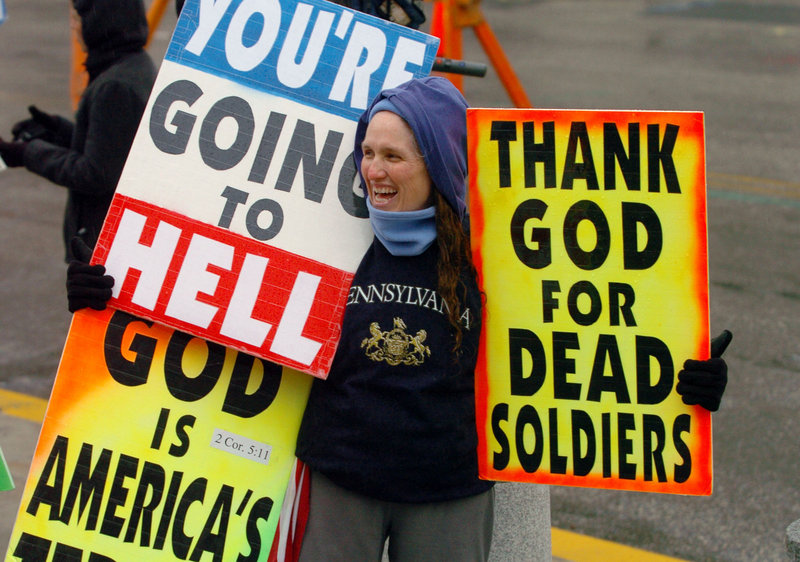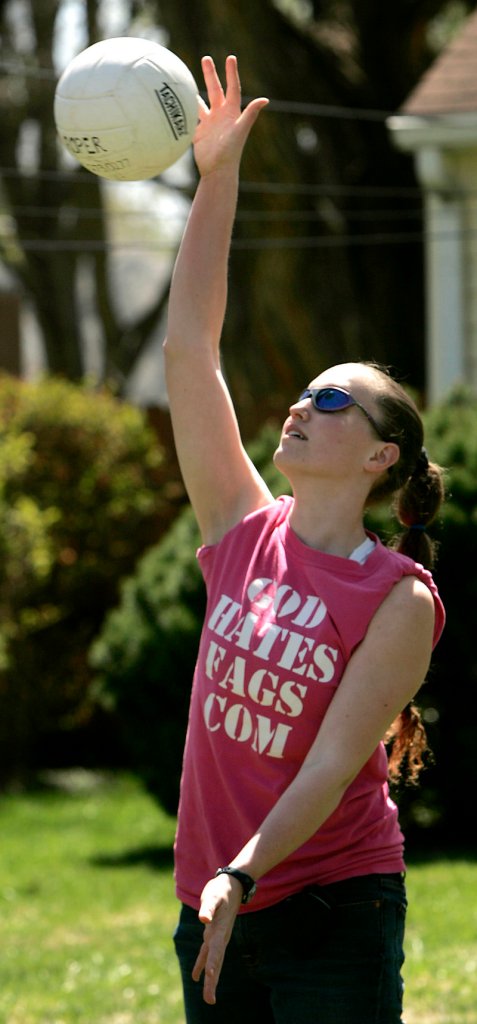KANSAS CITY, Kan. – In an ordinary town, in a quiet neighborhood, in a beige two-story house, a girl named Megan lives with her parents and eight siblings.
She is 25, with a cheeky smile. Tall and athletic, she has curly hair that tumbles down her shoulders when not in braids.
Her voice is bubbly, with a pinch of country twang, and when she is talking about something she likes, she leans forward and says “Ohmygosh!” before unleashing a stream of syllables that come pouring out on top of each other.
She is polite. If you were to stop by some afternoon, she would probably ask if you wanted to stay for pizza that night.
She is peppy, goofy and, by all accounts, happy.
Oh, and one other thing about Megan: She wants to make it perfectly clear that you and the rest of this filthy, perverted nation will be spending a long, fiery eternity burning in hell.
For much of the last two decades, in the shadow of the state capitol, the family-run Westboro Baptist Church has served as a training ground for hate.
From the age of 3, children are handed anti-gay, anti-Semitic picket signs and programmed to serve as soldiers in the Westboro Baptist Church’s army. They are taught the specifics of the group’s message — that America’s natural disasters are the direct result of a nationwide acceptance of homosexuality, that God is not the all-loving, all-forgiving being contemporary religion has made him out to be, that the church’s interpretation of the Bible is the only legitimate one. They are also taught to pray for the death of those with the audacity to try to silence the message.
None of this is evident on a sun-drenched Sunday as Megan Phelps-Roper, the granddaughter of longtime Westboro pastor Fred Phelps, stands on a porch not far from the large wooden privacy fence that serves as a barrier between the church and the outside world, smiling as she braids a little girl’s hair. Nor is it evident that she finds herself in the middle of what might most accurately be described as a spiritual family feud.
One of the most reviled families in America is gathered in the backyard, enjoying an afternoon picnic. Kids scurry past in every direction as adults sit on patio chairs, holding cold drinks and talking about work and the weather. A half-dozen or so little girls cluster around Megan, clamoring for braids.
Often these days, Megan is finding herself at the center of the church’s culture and day-to-day operations. She is both big sister and the voice that speaks to the millennial generation, a media-savvy spokeswoman who has emerged as an heir apparent.
She hopes to take the church’s cause mainstream through its social media presence (she has more than 7,000 Twitter followers) and appearing as a regular guest on “Afentra’s Big Fat Morning Buzz,” one of Kansas City’s edgiest and most popular morning radio shows. Her online musings have attracted the ire of celebrities, including actors Rainn Wilson and Michael Ian Black. As part of a group that measures success largely in the amount of publicity it is able to generate, she has helped propel the 40-member church to what might be the most visible stretch in its 56-year history.
In the past year, the church has appeared in front of the Supreme Court, arguing successfully that the group’s practice of picketing the funerals of U.S. soldiers was protected under the Constitution. It has been the subject of an hourlong BBC documentary that aired in April, and it inspired the new Kevin Smith film “Red State,” released on DVD last month.
But while the church’s profile has never been higher — in the last few weeks alone, the group has picketed a memorial for Apple Inc. founder Steve Jobs and the funeral of one of six men killed in an Atchison, Kan., grain elevator explosion — there exists a lingering uncertainty about its future.
Noticeably absent from the picnic is Fred Phelps, who at 82 has grown increasingly removed from the church’s everyday business. His daughter, fire-and-brimstone figurehead Shirley Phelps-Roper, 54, handles operations. But even she’s begun delegating more to others, with much of the work falling to Megan, her oldest daughter and the one who, more than any of her brothers, sisters or cousins, has been entrusted with the most responsibility.
As Shirley puts it, “She was always kind of my right-hand man.”
Megan has watched with unease as some of those closest to her have defected and then been cut off completely from the family. The older brother who left in the middle of the night the day before her high school graduation. The cousin and best friend who decided three years ago that the church’s practices had grown too extreme. Each departure forced her to confront the same frightening possibility: That she, too, could succumb to the same temptations.
That she, too, could fall away.
“That there would be something or some person that would draw me away from this church, this place that (is) the only place that I’ve ever seen, in all my travels and all the places I’ve been and picketed, that I see people who serve God in truth.
“I don’t want to be led astray,” she says. “… Yikes. Yeah, that’s what it is.”
And what she has chosen is a full-time job pitching a point of view that goes beyond what even most conservatives are willing to embrace.
On an average day inside the Westboro control center, which is actually the Phelps-Roper home: Ringing phones and incessant chatter and a lot of people coming and going. Snacks in the refrigerator and “Call of Duty” on the Xbox and Bibles of all shapes and sizes.
What you’ll also find, on a weekday morning, is Megan, wearing jeans and calf-high boots, fiddling with her iPhone and looking a little fatigued.
“Sometimes,” Megan said, “it can get kind of hectic.”
To most Americans, the group is one of the most abhorrent examples of hate in modern America.
“What they do is they run around blaming all of these folks at the most tragic moments of their lives,” says Heidi Beirich, a director of research for the Southern Poverty Law Center, who considers Westboro the country’s most obnoxious hate group. “… I mean, they’re a real nasty bunch of folks.
“Look, neo-Nazis are some nasty folks, and they say hurtful things. But this is like insulting every person in the United States.”
Megan is quick to dismiss her critics, but she finds it humorous that there are those who would like to “save” her.
People like her estranged cousin and an uncle and even director Kevin Smith, who two years ago launched a “Save Megan” campaign over Twitter.
“I remember being, like, 17 or 18 and hearing that, and now I’m 25 and hearing the same kinds of things,” she says. “It’s so funny. ‘You could still get out! You could still get out!’
“The idea that people feel that they have to be sympathetic to me? It’s a funny concept.”
She believes, too, that there’s more work to be done, more signs to be hoisted, more neighbors to be loved. Later that day, she will grab her “Keep God’s Law” sign and head over to a picket at Topeka’s City Hall.
Before she does, however, there’s one more point to make, crystal clear this time.
“I’m here because I want to be here,” she says. “Because I believe these things. Because I love these words.
“I’m all in.”
Copy the Story Link
Send questions/comments to the editors.




Success. Please wait for the page to reload. If the page does not reload within 5 seconds, please refresh the page.
Enter your email and password to access comments.
Hi, to comment on stories you must . This profile is in addition to your subscription and website login.
Already have a commenting profile? .
Invalid username/password.
Please check your email to confirm and complete your registration.
Only subscribers are eligible to post comments. Please subscribe or login first for digital access. Here’s why.
Use the form below to reset your password. When you've submitted your account email, we will send an email with a reset code.